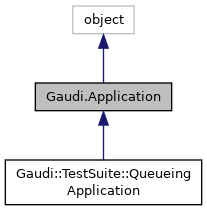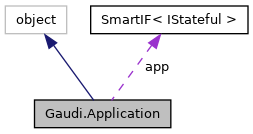 |
The Gaudi Framework
master (69a68366)
|
 |
The Gaudi Framework
master (69a68366)
|
Gaudi application entry point. More...
#include </builds/gaudi/Gaudi/GaudiKernel/include/Gaudi/Application.h>


Public Types | |
| using | Options = std::map<std::string, std::string> |
| using | Factory = Gaudi::PluginService::Factory<Application( Options )> |
Public Member Functions | |
| __init__ (self, opts, appType="Gaudi::Application") | |
| create (cls, appType, opts) | |
| run (self) | |
| __del__ (self) | |
| Application (Options opts) | |
| Construct and configure the application from the provided options. | |
| virtual | ~Application () |
| virtual int | run () |
| Implement the application main logic: | |
| int | run (std::function< int(SmartIF< IStateful > &)> action) |
| Run a user provided implementation of the application main logic. | |
Static Public Member Functions | |
| static Factory::ReturnType | create (std::string_view type, Options opts) |
| Factory function to instantiate a derived class via GaudiPluginService. | |
Protected Attributes | |
| _impl | |
| SmartIF< IStateful > | app |
| Handle to the ApplicationMgr instance. | |
Gaudi application entry point.
Gaudi::Application can be used to bootstrap a standard Gaudi application or to implement custom applications, either via a specialization that overrides the method run (which can be instantiated either directly or via the GaudiPluginService, with the helper create) or by passing a callable object to the dedicated run method.
Definition at line 27 of file Application.h.
| using Gaudi::Application::Factory = Gaudi::PluginService::Factory<Application( Options )> |
Definition at line 30 of file Application.h.
| using Gaudi::Application::Options = std::map<std::string, std::string> |
Definition at line 29 of file Application.h.
| Gaudi.Application.__init__ | ( | self, | |
| opts, | |||
| appType = "Gaudi::Application" ) |
Definition at line 90 of file __init__.py.
| Gaudi.Application.__del__ | ( | self | ) |
Definition at line 135 of file __init__.py.
| Gaudi::Application::Application | ( | Options | opts | ) |
Construct and configure the application from the provided options.
Definition at line 52 of file Application.cpp.
|
virtual |
Definition at line 73 of file Application.cpp.
| Gaudi.Application.create | ( | cls, | |
| appType, | |||
| opts ) |
Definition at line 129 of file __init__.py.
|
static |
Factory function to instantiate a derived class via GaudiPluginService.
Definition at line 47 of file Application.cpp.
| Gaudi.Application.run | ( | self | ) |
Reimplemented in Gaudi::TestSuite::QueueingApplication.
Definition at line 132 of file __init__.py.
|
virtual |
Implement the application main logic:
Reimplemented in Gaudi::TestSuite::QueueingApplication.
Definition at line 75 of file Application.cpp.
Run a user provided implementation of the application main logic.
Definition at line 46 of file Application.h.
|
protected |
Definition at line 124 of file __init__.py.
Handle to the ApplicationMgr instance.
Definition at line 50 of file Application.h.